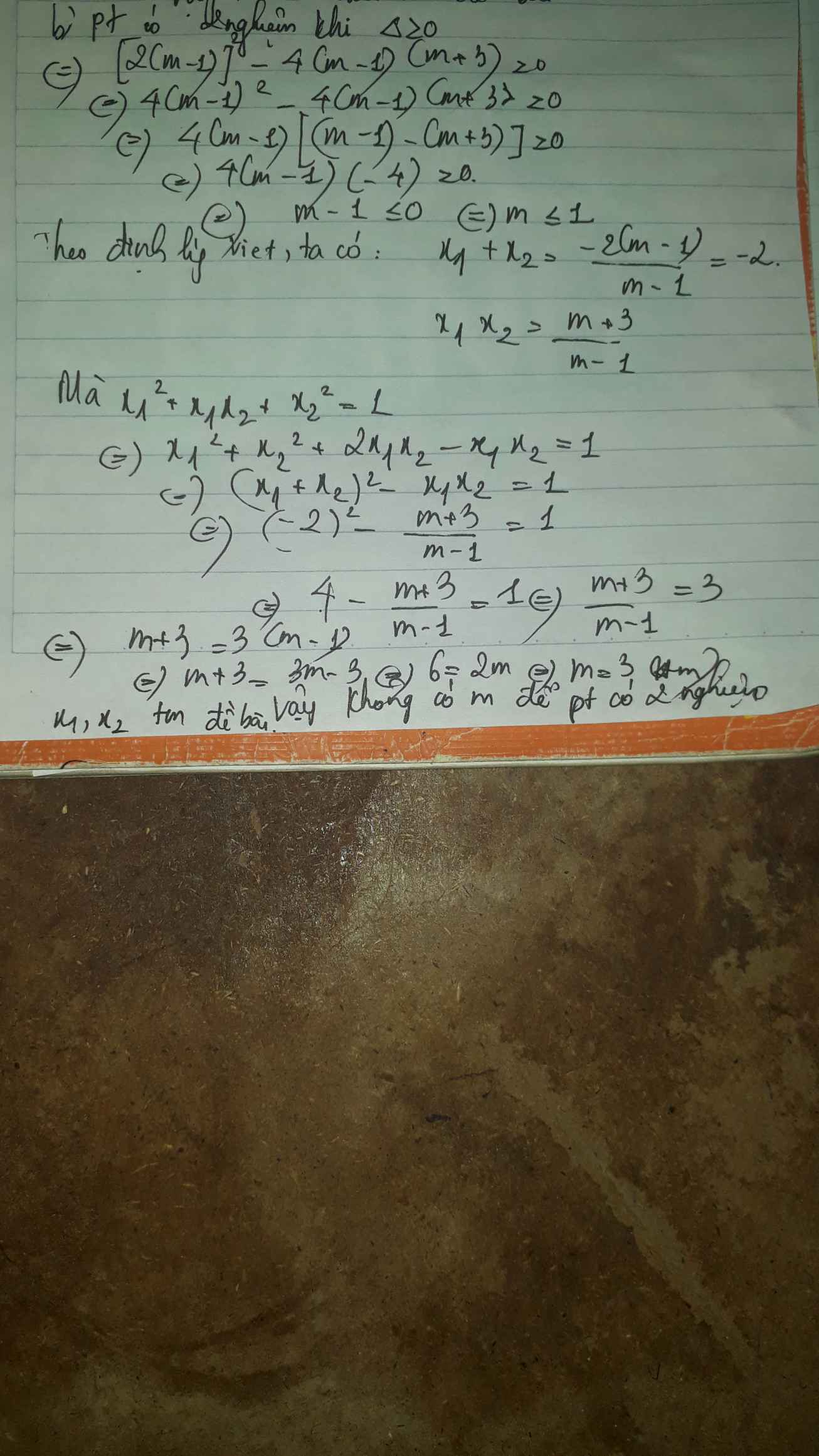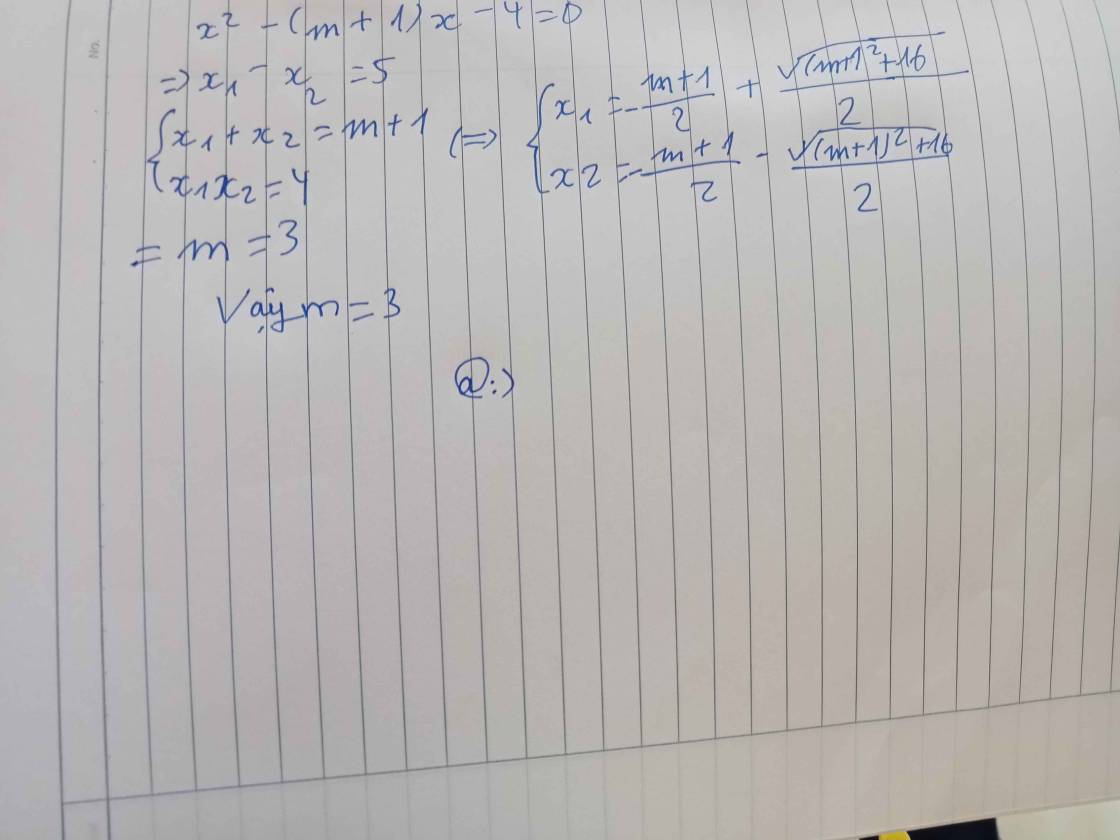Hãy nhập câu hỏi của bạn vào đây, nếu là tài khoản VIP, bạn sẽ được ưu tiên trả lời.

b) phương trình có 2 nghiệm \(\Leftrightarrow\Delta'\ge0\)
\(\Leftrightarrow\left(m-1\right)^2-\left(m-1\right)\left(m+3\right)\ge0\)
\(\Leftrightarrow m^2-2m+1-m^2-3m+m+3\ge0\)
\(\Leftrightarrow-4m+4\ge0\)
\(\Leftrightarrow m\le1\)
Ta có: \(x_1^2+x_1x_2+x_2^2=1\)
\(\Leftrightarrow\left(x_1+x_2\right)^2-2x_1x_2=1\)
Theo viet: \(\left\{{}\begin{matrix}x_1+x_2=-\dfrac{b}{a}=2\left(m-1\right)\\x_1x_2=\dfrac{c}{a}=m+3\end{matrix}\right.\)
\(\Leftrightarrow\left[-2\left(m-1\right)^2\right]-2\left(m+3\right)=1\)
\(\Leftrightarrow4m^2-8m+4-2m-6-1=0\)
\(\Leftrightarrow4m^2-10m-3=0\)
\(\Leftrightarrow\left[{}\begin{matrix}m_1=\dfrac{5+\sqrt{37}}{4}\left(ktm\right)\\m_2=\dfrac{5-\sqrt{37}}{4}\left(tm\right)\end{matrix}\right.\Rightarrow m=\dfrac{5-\sqrt{37}}{4}\)

b1: tìm đk m t/m: Δ>0 ↔ m∈(\(\dfrac{1-\sqrt{10}}{2}\) ; \(\dfrac{1+\sqrt{10}}{2}\))
b2: ➝x1+x2 =-2m-1 (1)
→ x1.x2=m^2-1 (2)
b3: biến đổi : (x1-x2)^2 = x1-5x2
↔ (x1+x2)^2 -4.x1.x2 -(x1+x2) +6.x2=0
↔4.m^2 +4m +1 - 4.m^2 +4 +2m+1+6. x2=0
↔x2= -m-1
B4: thay x2= -m-1 vào (1) → x1 = -m
Thay x2 = -m-1, x1 = -m vào (2)
→m= -1
B5: thử lại:
Với m= -1 có pt: x^2 -x =0
Có 2 nghiệm x1=1 và x2=0 (thoả mãn)

d: Ta có: \(\text{Δ}=\left(m+1\right)^2-4\cdot2\cdot\left(m+3\right)\)
\(=m^2+2m+1-8m-24\)
\(=m^2-6m-23\)
\(=m^2-6m+9-32\)
\(=\left(m-3\right)^2-32\)
Để phương trình có hai nghiệm phân biệt thì \(\left(m-3\right)^2>32\)
\(\Leftrightarrow\left[{}\begin{matrix}m-3>4\sqrt{2}\\m-3< -4\sqrt{2}\end{matrix}\right.\Leftrightarrow\left[{}\begin{matrix}m>4\sqrt{2}+3\\m< -4\sqrt{2}+3\end{matrix}\right.\)
Áp dụng hệ thức Vi-et, ta được:
\(\left\{{}\begin{matrix}x_1+x_2=\dfrac{m+1}{2}\\x_1x_2=\dfrac{m+3}{2}\end{matrix}\right.\)
Ta có: \(\left\{{}\begin{matrix}x_1+x_2=\dfrac{m+1}{2}\\x_1-x_2=1\end{matrix}\right.\Leftrightarrow\left\{{}\begin{matrix}2x_1=\dfrac{m+3}{2}\\x_2=x_1-1\end{matrix}\right.\)
\(\Leftrightarrow\left\{{}\begin{matrix}x_1=\dfrac{m+3}{4}\\x_2=\dfrac{m+3}{4}-\dfrac{4}{4}=\dfrac{m-1}{4}\end{matrix}\right.\)
Ta có: \(x_1x_2=\dfrac{m+3}{2}\)
\(\Leftrightarrow\dfrac{\left(m+3\right)\left(m-1\right)}{16}=\dfrac{m+3}{2}\)
\(\Leftrightarrow\left(m+3\right)\left(m-1\right)=8\left(m+3\right)\)
\(\Leftrightarrow\left(m+3\right)\left(m-9\right)=0\)
\(\Leftrightarrow\left[{}\begin{matrix}m=-3\\m=9\end{matrix}\right.\)

cái biêủ thức đề bài biến đổi để kết hợp với pt tổng trong Viet ra hệ pt tìm ra x1 x2 ròi that vào pt tích trong viet


Để phương trình có 2 nghiệm phân biệt
\(\Delta=\left(2-m\right)^2-4.1.\left(m-3\right)>0\Leftrightarrow m^2-4m+4-4m+12>0\)
\(\Leftrightarrow m^2-8m+16>0\Leftrightarrow\left(m-4\right)^2>0\Leftrightarrow m-4\ne0\Leftrightarrow m\ne4\)
Thấy : \(1+\left(2-m\right)+m-3=0\)
-> phương trình có nghiệm là 1
Th1 : \(x_1=1;x_2=\dfrac{c}{a}=m-3\)
\(\left|x_1\right|+x_2^2=2\Leftrightarrow\left|1\right|+\left(m-3\right)^2=2\)
\(\Leftrightarrow\left(m-3\right)^2=1\Leftrightarrow\)\(\left\{{}\begin{matrix}m-3=1\\m-3=-1\end{matrix}\right.\Leftrightarrow\left\{{}\begin{matrix}m=4\left(L\right)\\m=2\left(C\right)\end{matrix}\right.\)
TH2 : \(x_1=\dfrac{c}{a}=m-1;x_2=1\)
\(\Leftrightarrow\left|m-1\right|+1^2=2\Leftrightarrow\left|m-1\right|=1\)
hoàn toàn giống với th1.
Vậy \(m=2\)
Ôi e ơi, sao mà làm kiểu: Thấy... như này được
\(\Delta>0\Leftrightarrow m\ne4\)
Phương trình có hai nghiệm\(\left[{}\begin{matrix}x=\dfrac{-\left(2-m\right)-\left(m-4\right)}{2}=1\\x=\dfrac{-\left(2-m\right)+\left(m-4\right)}{2}=m-3\end{matrix}\right.\)
Sau đó chia trường hợp